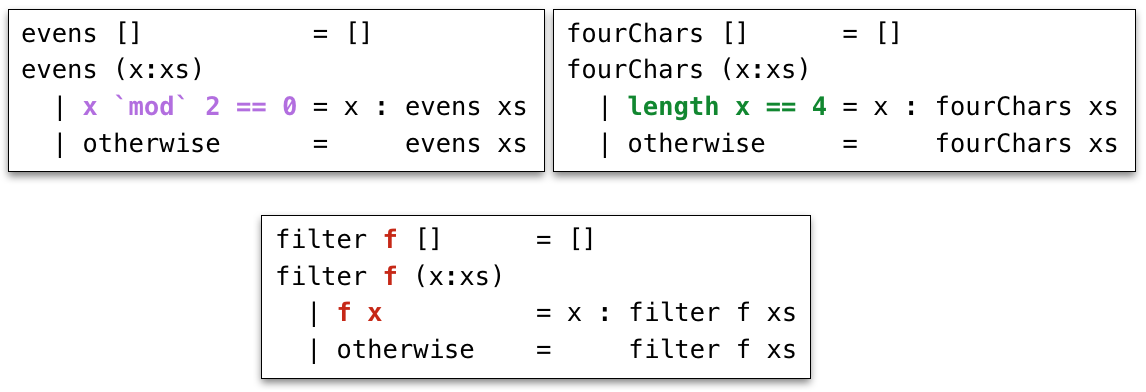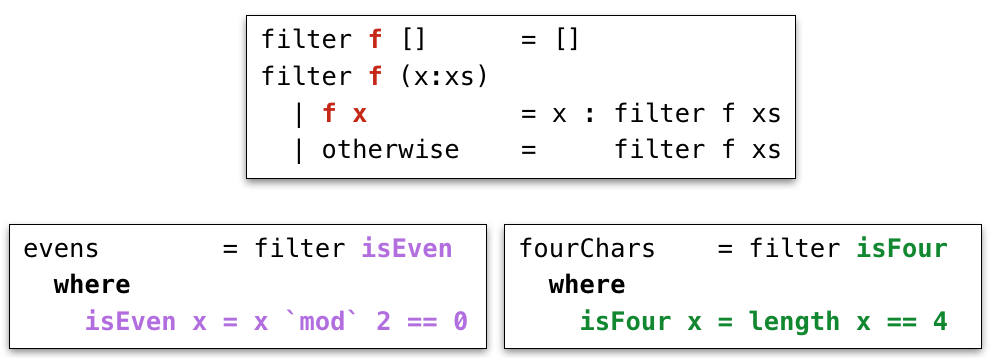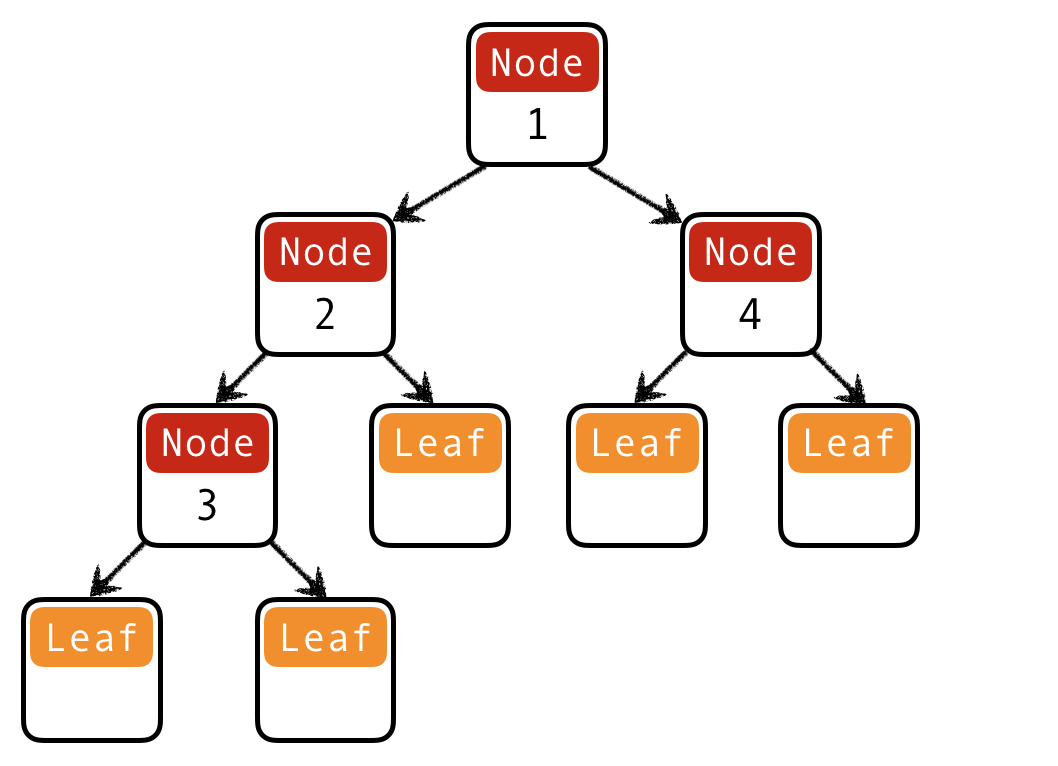Bottling Computation Patterns
Another way to practice D.R.Y:
spot common computation patterns
refactor them into reusable higher-order functions (HOFs)
useful library HOFs:
map,filter, andfold
EXERCISE: evens
Write a function evens that extracts only even elements from an integer list.
-- evens [] ==> []
-- evens [1,2,3,4] ==> [2,4]
evens :: [Int] -> [Int]
evens [] = ...
evens (x:xs) = ...
Example: four-letter words
Let’s write a function fourChars:
-- fourChars [] ==> []
-- fourChars ["i","must","do","work"] ==> ["must","work"]
fourChars :: [String] -> [String]
fourChars [] = ...
fourChars (x:xs) = ...
Yikes, Most Code is the Same
Lets rename the functions to foo:
foo [] = []
foo (x:xs)
| x mod 2 == 0 = x : foo xs
| otherwise = foo xs
foo [] = []
foo (x:xs)
| length x == 4 = x : foo xs
| otherwise = foo xsOnly difference is the condition
x mod 2 == 0vslength x == 4
Moral of the day
D.R.Y. Don’t Repeat Yourself!
Can we
- reuse the general pattern and
- substitute in the custom condition?
HOFs to the rescue!
General Pattern
- expressed as a higher-order function
- takes customizable operations as arguments
Specific Operation
- passed in as an argument to the HOF
The “filter” pattern

filter PatternGeneral Pattern
- HOF
filter - Recursively traverse list and pick out elements that satisfy a predicate
Specific Operations
- Predicates
isEvenandisFour

filter instances
filter bottles the common pattern of selecting elements from a list that satisfy a condition:

Let’s talk about types
-- evens [1,2,3,4] ==> [2,4]
evens :: [Int] -> [Int]
evens xs = filter isEven xs
where
isEven :: Int -> Bool
isEven x = x `mod` 2 == 0filter :: ???
-- fourChars ["i","must","do","work"] ==> ["must","work"]
fourChars :: [String] -> [String]
fourChars xs = filter isFour xs
where
isFour :: String -> Bool
isFour x = length x == 4filter :: ???
So what’s the type of filter?
filter :: (Int -> Bool) -> [Int] -> [Int] -- ???
filter :: (String -> Bool) -> [String] -> [String] -- ???It does not care what the list elements are
- as long as the predicate can handle them
It’s type is polymorphic (generic) in the type of list elements
-- For any type `a`
-- if you give me a predicate on `a`s
-- and a list of `a`s,
-- I'll give you back a list of `a`s
filter :: (a -> Bool) -> [a] -> [a]
Example: all caps
Lets write a function shout:
-- shout [] ==> []
-- shout ['h','e','l','l','o'] ==> ['H','E','L','L','O'] shout :: [Char] -> [Char]
shout [] = ...
shout (x:xs) = ...
Example: squares
Lets write a function squares:
-- squares [] ==> []
-- squares [1,2,3,4] ==> [1,4,9,16] squares :: [Int] -> [Int]
squares [] = ...
squares (x:xs) = ...
Yikes, Most Code is the Same
Lets rename the functions to foo:
-- shout
foo [] = []
foo (x:xs) = toUpper x : foo xs
-- squares
foo [] = []
foo (x:xs) = (x * x) : foo xs
Lets refactor into the common pattern
pattern = ...
The “map” pattern

map PatternGeneral Pattern
- HOF
map - Apply a transformation
fto each element of a list
Specific Operations
- Transformations
toUpperand\x -> x * x
map bottles the common pattern of iteratively applying a transformation to each element of a list:

EXERCISE: refactor with map
With map defined as:
map f [] = []
map f (x:xs) = f x : map f xsrefactor shout and squares to use map:
shout xs = map ...
squares xs = map ...
The Case of the Missing Parameter
The following definitions of shout are equivalent:
shout :: [Char] -> [Char]
shout xs = map (\x -> toUpper x) xsand
shout :: [Char] -> [Char]
shout = map toUpperWhere did xs and x go???
The Case of the Missing Parameter
Recall lambda calculus:
The expressions f and \x -> f x are in some sense “equivalent”
- as long as
x not in FV(f)
because they behave the same way when applied to any argument e:
(\x -> f x) e
=b> f eTransforming \x -> f x into f is called eta contraction
- and the reverse is called eta expansion
In Haskell we have:
shout xs = map (\x -> toUpper x) xsis syntactic sugar for:
shout
=d>
\xs -> map (\x -> toUpper x) xs
=e> -- eta-contract outer lambda
map (\x -> toUpper x) xs
=e> -- eta-contract inner lambda
map toUpper xs
More generally, whenever you want to define a function:
f x y z = e x y zyou can save some typing, and omit the parameters:
- as long as
x,y, andzare not free ine
f = e
QUIZ
What is the type of map?
map f [] = []
map f (x:xs) = f x : map f xs(A) (Char -> Char) -> [Char] -> [Char]
(B) (Int -> Int) -> [Int] -> [Int]
(C) (a -> a) -> [a] -> [a]
(D) (a -> b) -> [a] -> [b]
(E) (a -> b) -> [c] -> [d]
The type of “map”
-- For any types `a` and `b`
-- if you give me a transformation from `a` to `b`
-- and a list of `a`s,
-- I'll give you back a list of `b`s
map :: (a -> b) -> [a] -> [b]Type says it all!
Can you think of a function that:
- has this type
- builds the output list not by applying the transformation to the input list?
Example: summing a list
-- sum [] ==> 0
-- sum [1,2,3] ==> 6
sum :: [Int] -> Int
sum [] = ...
sum (x:xs) = ...
Example: string concatenation
-- cat [] ==> ""
-- cat ["carne","asada","torta"] ==> "carneasadatorta"
cat :: [String] -> String
cat [] = ...
cat (x:xs) = ...
Can you spot the pattern?
-- sum
foo [] = 0
foo (x:xs) = x + foo xs
-- cat
foo [] = ""
foo (x:xs) = x ++ foo xspattern = ...
The “fold-right” pattern
foldr op base [] = base
foldr op base (x:xs) = op x (foldr op base xs)General Pattern
- Recurse on tail
- Combine result with the head using some binary operation
foldr bottles the common pattern of combining/reducing a list into a single value:

EXERCISE: refactor with fold
With foldr defined as:
foldr op base [] = base
foldr op base (x:xs) = op x (foldr op base xs)refactor sum and cat to use foldr:
sum xs = foldr op base xs
where
base = ...
op x acc = ...
cat xs = foldr op base xs
where
base = ...
op x acc = ...Now use eta-contraction to make your code more concise!
Solution
sum xs = foldr op base xs
where
base = 0
op x acc = x + acc
cat xs = foldr op base xs
where
base = ""
op x acc = x ++ accor, more concisely:
sum = foldr (+) 0
cat = foldr (++) ""
Executing “foldr”
To develop some intuition about foldr lets “run” it by hand.
foldr op base [] = base
foldr op base (x:xs) = op x (foldr op base xs)
foldr op b (a1:a2:a3:[])
==>
a1 `op` (foldr op b (a2:a3:[]))
==>
a1 `op` (a2 `op` (foldr op b (a3:[])))
==>
a1 `op` (a2 `op` (a3 `op` (foldr op b [])))
==>
a1 `op` (a2 `op` (a3 `op` b))Look how it mirrors the structure of lists!
(:)is replaced byop[]is replaced bybase
For example:
foldr (+) 0 [1, 2, 3, 4]
==> 1 + (foldr (+) 0 [2, 3, 4])
==> 1 + (2 + (foldr (+) 0 [3, 4]))
==> 1 + (2 + (3 + (foldr (+) 0 [4])))
==> 1 + (2 + (3 + (4 + (foldr (+) 0 []))))
==> 1 + (2 + (3 + (4 + 0)))Accumulate the values from the right!
QUIZ
What is the most general type of foldr?
foldr op base [] = base
foldr op base (x:xs) = op x (foldr op base xs)(A) (a -> a -> a) -> a -> [a] -> a
(B) (a -> a -> b) -> a -> [a] -> b
(C) (a -> b -> a) -> b -> [a] -> b
(D) (a -> b -> b) -> b -> [a] -> b
(E) (b -> a -> b) -> b -> [a] -> b
Answer: D
QUIZ
Recall the function to compute the len of a list
len :: [a] -> Int
len [] = 0
len (x:xs) = 1 + len xsWhich of these is a valid implementation of len
A. len = foldr (\n -> n + 1) 0
B. len = foldr (\n m -> n + m) 0
C. len = foldr (\_ n -> n + 1) 0
D. len = foldr (\x xs -> 1 + len xs) 0
E. All of the above
HINT: remember that foldr :: (a -> b -> b) -> b -> [a] -> b!
The Missing Parameter Revisited
We wrote foldr as
foldr :: (a -> b -> b) -> b -> [a] -> b
foldr op base [] = base
foldr op base (x:xs) = op x (foldr op base xs)but can also write this
foldr :: (a -> b -> b) -> b -> [a] -> b
foldr op base = go
where
go [] = base
go (x:xs) = op x (go xs)Can someone explain where the xs went missing ?
Aside: folding right vs left
We can also fold a list from the left:
foldl op b (a1:a2:a3:[])
==>
foldl op (b `op` a1) (a2:a3:[])
==>
foldl op ((b `op` a1) `op` a2) (a3:[])
==>
foldl op (((b `op` a1) `op` a2) `op` a3) []
==>
((b `op` a1) `op` a2) `op` a3Contrast this to folding from the right:
foldr op b (a1:a2:a3:[])
==>
a1 `op` (foldr op b (a2:a3:[]))
==>
a1 `op` (a2 `op` (foldr op b (a3:[])))
==>
a1 `op` (a2 `op` (a3 `op` (foldr op b [])))
==>
a1 `op` (a2 `op` (a3 `op` b))
Left vs. Right
foldr :: (a -> b -> b) -> b -> [a] -> b
foldr op base = go
where
go [] = base
go (x:xs) = op x (go xs)
foldl :: (b -> a -> b) -> b -> [a] -> b -- Different type!
foldl op base = go base
where
go acc [] = acc
go acc (x:xs) = go (op acc x) xs -- Different recursion!
Trees
Recall binary trees of integers ITree from last time.
They can be generalized to trees of any type a:
data Tree a
= Leaf
| Node a (Tree a) (Tree a)
t1234 :: Tree Int
t1234 = Node 1
(Node 2 (Node 3 Leaf Leaf) Leaf)
(Node 4 Leaf Leaf)
EXERCISE: tree height
Write a function to compute the height of a tree, where
- height is the max number of
Nodes on a path from the root to a leaf
data Tree a = Leaf | Node a (Tree a) (Tree a)
height :: Tree a -> Int
height Leaf = ???
height (Node x l r) = ???
>>> height t1234
3
Examples: tree sum
Let’s write a function to sum the leaves of an Int tree:
sumTree :: Tree Int -> Int
sumTree Leaf = ???
sumTree (Node x l r) = ???
>>> sumTree t1234
10
Let’s write a function to gather all the elements in the tree:
toList :: Tree a -> [a]
toList Leaf = ???
toList (Node x l r) = ???
>>> toList t1234
[1,2,3,4]
Pattern: Tree Fold
Can you spot the pattern? Those three functions are almost the same!
Step 1: Rename to maximize similarity
-- height
foo Leaf = 0
foo (Node x l r) = 1 + max (foo l) (foo l)
-- sumTree
foo Leaf = 0
foo (Node x l r) = foo l + foo r
-- toList
foo Leaf = []
foo (Node x l r) = x : foo l ++ foo rStep 2: Identify the differences
- ???
- ???
Step 3 Make differences a parameter
foo p1 p2 Leaf = ???
foo p1 p2 (Node x l r) = ???
Pattern: Tree fold
tFold op base Leaf = base
tFold op base (Node x l r) = op x (tFold op base l) (tFold op base r)Lets try to work out the type of tFold!
tFold :: ??? -> ??? -> Tree a -> ???
tFold :: (a -> b -> b -> b) -> b -> Tree a -> b
tFold op base = go
where
go Leaf = base
go (Node x l r) = op x (go l) (go r)
QUIZ
Suppose that t :: Tree Int.
What does tFold (\x y z -> y + z) 1 t return?
a. 0
b. the largest element in the tree t
c. the number of nodes of the tree t
d. the number of leaves of the tree t
e. type error
EXERCISE: using tree fold
Write a function to compute the largest element in a tree or 0 if tree is empty or all negative.
treeMax :: Tree Int -> Int
treeMax t = tFold f b t
where
b = ???
f x l r = ??? Recall that tFold is defined as
tFold :: (a -> b -> b -> b) -> b -> Tree a -> b
tFold op base = go
where
go Leaf = base
go (Node x l r) = op x (go l) (go r)
Map over Trees
We can also write a tmap equivalent of map for Trees
treeMap :: (a -> b) -> Tree a -> Tree b
treeMap f Leaf = Leaf
treeMap f (Node x l r) = Node (f x) (treeMap f l) (treeMap f r)which gives
>>> treeMap (\n -> n * n) tree1234 -- square all elements of tree
Node 1 (Node 4 (Node 9 Leaf Leaf) Leaf) (Node 16 Leaf Leaf)
EXERCISE: map via fold
Can we rewrite treeMap using tFold?
treeMap :: (a -> b) -> Tree a -> Tree b
treeMap f = tFold op base
where
base = ???
op x l r = ???
Folding custom data types
We can also write fancy folds for our own data types!
For example, here is a “directory” data type from HW1:
data Dir a
= Fil a -- A single file named `a`
| Sub a [Dir a] -- A sub-directory name `a` with contents `[Dir a]`
data DirElem a
= File a -- A single File named `a`
| SubDir a -- A single Sub-Directory named `a`
foldDir :: ([a] -> r -> DirElem a -> r) -> r -> Dir a -> r
foldDir op r0 dir = go [] r0 dir
where
go path r (Fil a) = op path r (File a)
go path r (Sub a ds) = foldl' (go path') r' ds
where
r' = op path r (SubDir a)
path' = a:pathfoldDir takes as input
an operation
opof type[a] -> r -> DirElem a -> rtakes as input the path
[a], the current resultr, the nextDirElem [a]and returns as output the new result
r
an initial value of the result
r0anddirectory to fold over
dir
And returns the result of running the accumulator over the whole dir.
Higher Order Functions
Iteration patterns over collections:
- Filter values in a collection given a predicate
- Map (iterate) a given transformation over a collection
- Fold (reduce) a collection into a value, given a binary operation to combine results
HOFs can be put into libraries to enable modularity
Data structure library implements
map,filter,foldfor its collectionsgeneric efficient implementation
generic optimizations:
map f (map g xs) --> map (f.g) xs
Data structure clients use HOFs with specific operations
no need to know the implementation of the collection
less to write
easier to communicate
avoid bugs due to repetition
Indeed, HOFs were the basis of map/reduce and the big-data revolution
Can parallelize and distribute computation patterns just once
Reuse across hundreds or thousands of instances!
